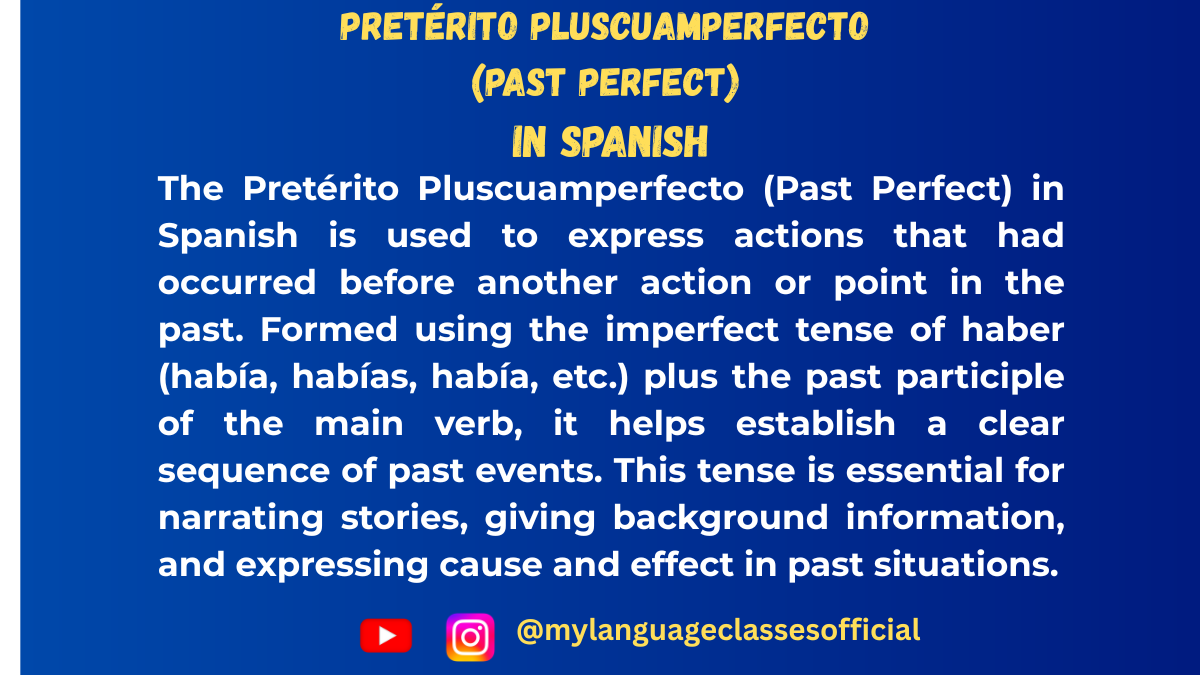Your cart is currently empty!
Tag: irregular verbs in Pretérito Pluscuamperfecto
-

Pretérito Pluscuamperfecto (Past Perfect) in Spanish
The Pretérito Pluscuamperfecto, also known as the Past Perfect, is a verb tense used in Spanish to describe actions that occurred before another action in the past. It is commonly used in storytelling, recounting experiences, and expressing regrets or unrealized conditions.
How to Form the Pretérito Pluscuamperfecto
The Pretérito Pluscuamperfecto is formed using the imperfect tense of the auxiliary verb ‘haber’ + the past participle of the main verb.
Conjugation of ‘haber’ in Imperfect Tense
Subject Conjugation Yo Había Tú Habías Él/Ella/Usted Había Nosotros/Nosotras Habíamos Vosotros/Vosotras Habíais Ellos/Ellas/Ustedes Habían Forming the Past Participle
The past participle is formed by:
- -ar verbs → replacing -ar with -ado (e.g., hablar → hablado)
- -er and -ir verbs → replacing -er/-ir with -ido (e.g., comer → comido, vivir → vivido)
Uses of Pretérito Pluscuamperfecto
- To describe actions that happened before another past event
- Cuando llegué, ellos ya se habían ido. (When I arrived, they had already left.)
- To express past experiences before another event
- Nunca había visto una película tan emocionante. (I had never seen such an exciting movie.)
- To express regrets or missed opportunities
- Ojalá me hubieras avisado antes. (I wish you had told me earlier.)
- To talk about indirect speech in the past
- Dijo que ya había comido. (He said that he had already eaten.)
- To describe conditions in hypothetical past situations
- Si hubieras estudiado, habrías aprobado. (If you had studied, you would have passed.)
Common Expressions with Pretérito Pluscuamperfecto
Spanish Expression Meaning in English Ya había terminado I had already finished Nunca había visto I had never seen Todavía no había llegado I hadn’t arrived yet Antes de que llegara Before (he/she) arrived Apenas había empezado I had just started No había entendido nada I hadn’t understood anything Cuando llegué, ya se había ido When I arrived, (he/she) had already left No me había dado cuenta I hadn’t realized
Regular Verbs in Pretérito Pluscuamperfecto
Verb Yo Tú Él/Ella/Usted Nosotros Vosotros Ellos/Ellas/Ustedes Example Sentences Hablar (to talk) Había hablado Habías hablado Había hablado Habíamos hablado Habíais hablado Habían hablado 1. Cuando llegué, ellos ya habían hablado.
2. Nunca había hablado con ella antes.Comer (to eat) Había comido Habías comido Había comido Habíamos comido Habíais comido Habían comido 1. Ya había comido antes de salir.
2. Nunca había comido sushi.Vivir (to live) Había vivido Habías vivido Había vivido Habíamos vivido Habíais vivido Habían vivido 1. Había vivido en España por cinco años.
2. Nunca había vivido solo antes.
Irregular Verbs in Pretérito Pluscuamperfecto
Verb Past Participle Example Sentence Hacer (to do/make) Hecho Había hecho la tarea antes de la clase. Decir (to say) Dicho Nunca había dicho eso antes. Ver (to see) Visto Había visto esa película muchas veces. Escribir (to write) Escrito Habíamos escrito una carta. Romper (to break) Roto Había roto mi teléfono accidentalmente.
More Example Sentences
- Cuando llegué a casa, mi madre ya había cocinado.
- Nunca había viajado en avión antes.
- Habíamos hablado de este tema antes.
- Ya habías leído el libro cuando te lo recomendé.
- Ellos nunca habían visitado París.
- Cuando llegó la profesora, los estudiantes ya habían terminado el examen.
- Mi hermano había estudiado mucho antes del examen.
- Nosotros nunca habíamos visto un espectáculo tan impresionante.
- Habías olvidado mi cumpleaños otra vez.
- Antes de que saliera el sol, ya habíamos caminado muchos kilómetros.
Things to Keep in Mind
- Agreement in gender and number does not apply because the past participle remains the same.
- Articles like ‘el’ and ‘la’ follow standard noun rules.
- In negative sentences, ‘no’ comes before ‘haber’ (e.g., No había entendido).
- Reflexive verbs place the pronoun before ‘haber’ (e.g., Me había despertado temprano).
Fill in the Blanks
- Cuando llegué, ya ______ (terminar) la reunión.
- Nosotros nunca ______ (ver) una película tan interesante.
- Antes de salir, ya ______ (hacer) la tarea.
- Mi hermana ya ______ (decidir) qué estudiar.
- No me ______ (dar cuenta) de la hora.
- Cuando lo llamé, él ya ______ (salir) de casa.
- Nosotros ______ (comer) antes de la película.
- Cuando empezó la clase, ellos ya ______ (leer) el libro.
- Ella nunca ______ (visitar) ese museo antes.
- No ______ (escuchar) sobre ese problema antes.
Answers
- Había terminado 2. Habíamos visto 3. Había hecho 4. Había decidido 5. Había dado cuenta 6. Había salido 7. Habíamos comido 8. Habían leído 9. Había visitado 10. Había escuchado
Conclusion
The Pretérito Pluscuamperfecto is essential for narrating past events that happened before another past action. Mastering this tense helps in better storytelling, expressing regrets, and making past comparisons. Keep practicing with different verbs and contexts to use it naturally in conversations!
If you enjoyed this lesson, be sure to check out more posts like this on my blog at My Language Classes. Don’t forget to subscribe my YouTube channel and follow me on Instagram for the latest language learning tips and lessons. Leave a comment below to share your thoughts, or ask any questions you have about nouns.
Happy learning! 😊
- 100 Spanish Example Sentences
- 100 Spanish Fill-in-the-Blanks Exercises
- 100 Spanish Vocabulary Lists
- Spanish – Advanced
- Spanish – Beginner
- Spanish – Intermediate
